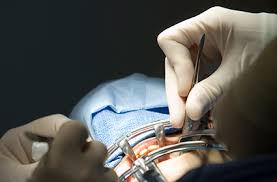
Oral and Maxillofacial surgery focuses on the identification, surgical intervention, and additional treatments for diseases, injuries, and abnormalities affecting the human jaws, as well as the associated structures of the mouth and face.
Duration:
The MDS program in Oral and Maxillofacial Surgery typically spans a duration of three years, during which students undergo rigorous academic coursework, clinical rotations, and research activities.
Click here if you want to know about course fees.
Eligibility Criteria:
To be eligible for admission to the Master in Dental Surgery (MDS) course, the candidate must meet the following requirements:
1) Possess a recognized Bachelor in Dental Surgery (BDS) degree awarded by a university or institute in India.
2) Be registered with the State Dental Council and hold either provisional or permanent registration.
3) Have completed a compulsory rotatory internship of one year in an approved or recognized dental college.
4) Candidates must qualify the NEET PG exam with a proficient score & should have registered for Central Government Counseling.
Program Objective:
The program objective of MDS (Master of Dental Surgery) in Oral and Maxillofacial Surgery:
1) To provide advanced knowledge and skills in the field of oral and maxillofacial surgery.
2) To train dentists to become competent specialists in the diagnosis, treatment, and management of conditions affecting the oral and maxillofacial region.
3) To develop expertise in surgical procedures involving the mouth, jaws, face, and associated structures.
4) To foster proficiency in the management of trauma, infections, tumors, congenital anomalies, and other conditions of the oral and maxillofacial region.
5) To cultivate skills in the surgical treatment of oral and facial pain disorders, temporomandibular joint disorders, and other functional problems.
6) To enhance understanding of the principles and techniques related to oral implantology, orthognathic surgery, facial aesthetics, and reconstructive procedures.
7) To promote research and scholarly activities in the field of oral and maxillofacial surgery, leading to advancements in knowledge and patient care.
8) To train specialists to collaborate effectively with other healthcare professionals in multidisciplinary settings.
9) To instill ethical values, professionalism, and a commitment to providing compassionate care to patients.
10) To prepare graduates for academic and teaching positions, enabling them to contribute to the education and training of future oral and maxillofacial surgeons.
The curriculum covers various subjects and practical training to ensure that students acquire the necessary knowledge and skills to become competent oral and maxillofacial surgeons. Here is an overview of the curriculum:
Course Outline:
A) Applied Health Sciences:
Applied Anatomy
Physiology
Biochemistry
Pathology
Oral Pathology
Microbiology
Applied Pharmacology and Therapeutics
B) Oral and Maxillofacial Surgery:
Principles of Oral and Maxillofacial Surgery
Diagnosis and Treatment Planning
Oral Surgery Procedures
Maxillofacial Trauma Management
Orthognathic Surgery
Temporomandibular Joint Disorders
Oncology & Maxillofacial Reconstruction
Basic & Advanced Implantology
C) Allied Specialties:
General medicine
General surgery
Neuro-surgery
ENT/Ophthalmology
Orthopedic
Anesthesiology
Plastic Surgery
Theory & Examination:
A) Theory:
Part-I:
Part- II:
Paper-I: Minor Oral Surgery and Trauma
Paper-II: Maxillo-facial Surgery
Paper-III: Descriptive and analyzing type question
B) Practical / Clinical Examination:
Minor Oral Surgery
Case presentation and discussion
C. Viva Voce
Viva-Voce examination
Pedagogy
Career Prospective:
Career Prospects of MDS Oral and Maxillofacial Surgery:
Completing an MDS (Master of Dental Surgery) in Oral and Maxillofacial Surgery opens up a wide range of promising career opportunities for individuals. Here are some prospective career paths for MDS Oral and Maxillofacial Surgery graduates:
Consultant Oral and Maxillofacial Surgeon:
Post Graduates can pursue a career as an oral and maxillofacial surgeon in various settings, including private practice, hospitals, dental clinics, and academic institutions. As specialists in surgical interventions for conditions affecting the mouth, jaws, and facial structures, they perform minor surgical procedures such as removal of impacted teeth, biopsies, management of Cyst & Tumor & maxillofacial trauma, various reconstructive surgery, and oncology.
Academic and Research Roles:
MDS graduates can choose to pursue careers in academia and research. They can join dental colleges and universities as faculty members, teaching and mentoring dental students, and conducting research in oral and maxillofacial surgery. Academic positions also provide opportunities for publishing research papers and contributing to the advancement of the field.
Hospital-based Practice:
Many MDS Oral and Maxillofacial Surgery graduates work in hospital-based settings, collaborating with multidisciplinary teams to provide specialized oral and maxillofacial surgical care. They may be involved in treating complex cases, assisting in trauma management, and participating in oral and maxillofacial oncology teams.
Government and Public Health Sectors:
Graduates can explore job opportunities in government healthcare organizations, public health departments, and defense services. They may work in hospitals or clinics that cater to a larger population and provide specialized oral and maxillofacial surgical services to the community.
Private Practice:
MDS Oral and Maxillofacial Surgery graduates can establish their own private practices, offering specialized surgical services to patients. They can build a reputation and develop a referral network by collaborating with other dental and medical professionals, providing comprehensive oral and maxillofacial surgical care.
International Opportunities:
With the increasing demand for oral and maxillofacial surgeons worldwide, MDS graduates have opportunities to work abroad. They can explore job prospects in countries where there is a shortage of skilled oral and maxillofacial surgeons, or they can participate in international fellowships or exchange programs to gain exposure to different healthcare systems.
Entrepreneurship and Dental Implantology:
Graduates can venture into the field of dental implantology, focusing on the placement and restoration of dental implants. They can establish specialized implant centers or partner with prosthodontists or general dentists to provide comprehensive implant-supported prosthetic solutions.
Continuing Education and Specialization:
MDS Oral and Maxillofacial Surgery graduates can choose to pursue further specialization through various fellowship programs offered by the AOMSI or additional certifications. Specializations may include cleft lip and palate surgery, craniofacial surgery, temporomandibular joint disorders, oral and maxillofacial pathology, Trauma&Orthognathic surgery.
>